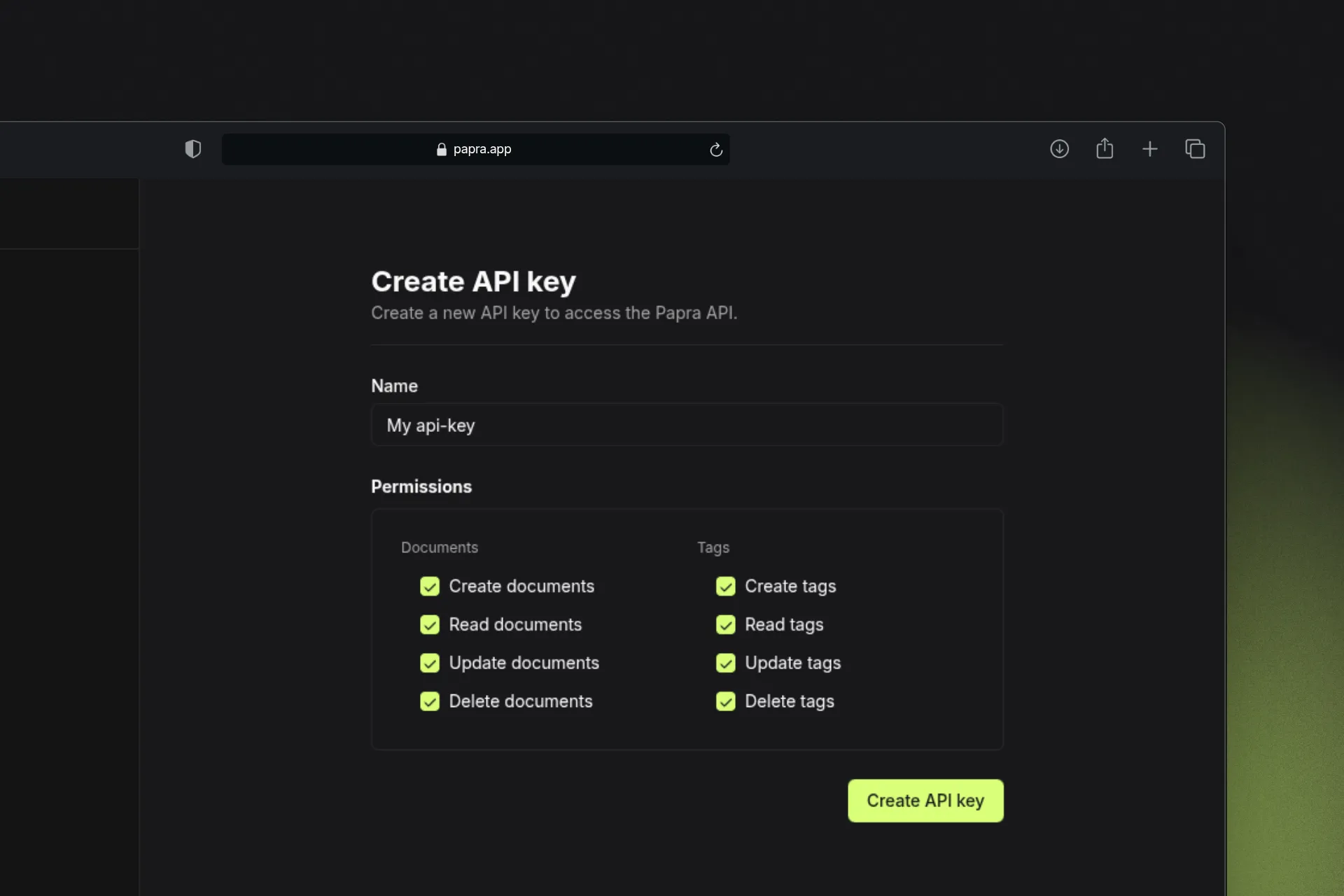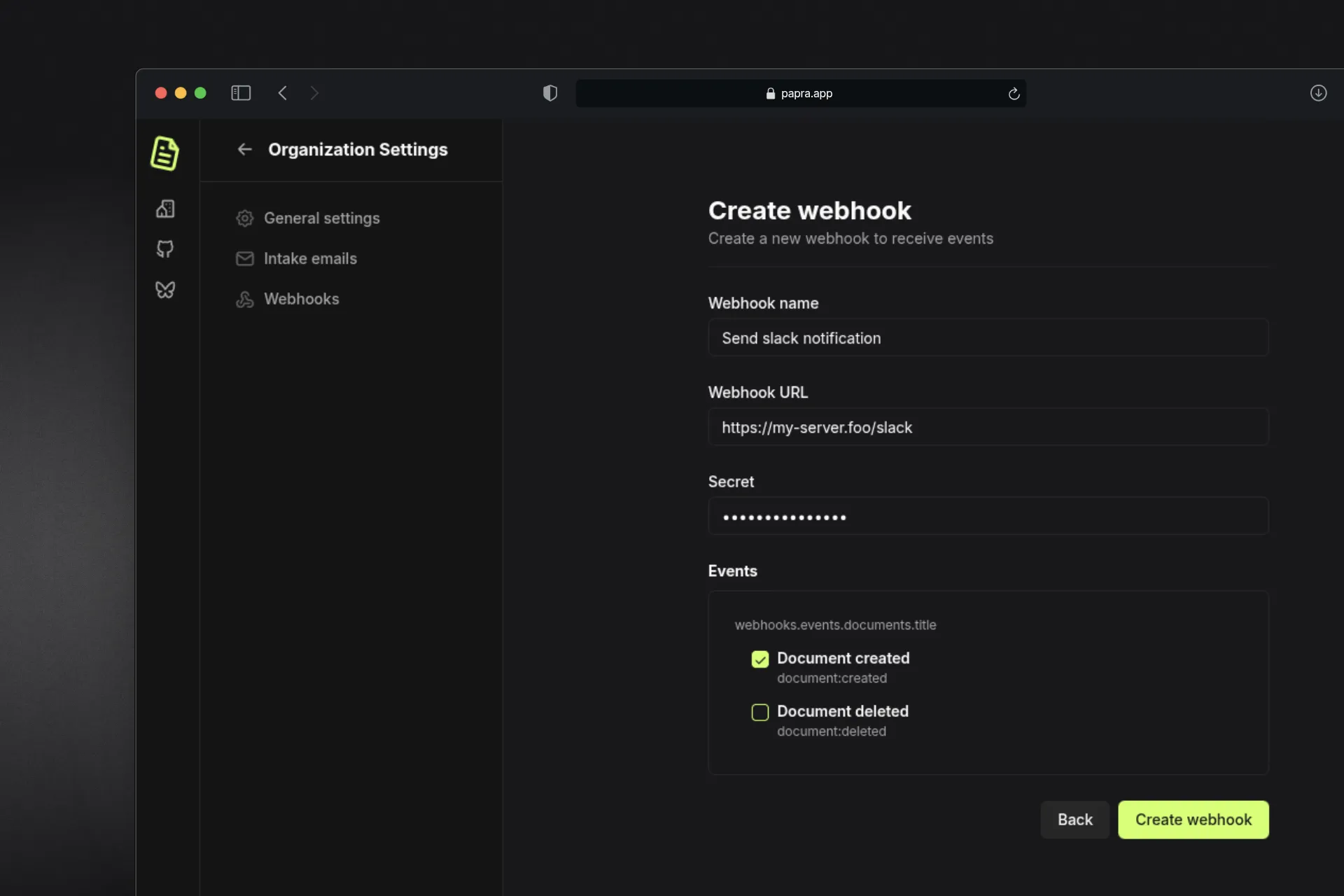I’m thrilled to announce the release of Papra v0.4! This release focuses on empowering developers with new tools and integrations to build powerful solutions with Papra.
Developer Tools
API Keys
This release introduces API keys, allowing you to securely interact with Papra’s API. You can create and manage API keys from your user settings page. Each key can have different permissions, making it easy to control access to your documents.

To use the API, simply include your API key in the Authorization header, for example, in a curl request:
curl -X POST https://your-papra-instance/api/organizations/<organization-id>/documents \ -H "Authorization: Bearer <your-api-key>" \ -H "Content-Type: multipart/form-data" \TypeScript/JavaScript SDK
For JavaScript and TypeScript developers, we’ve created a first-party SDK that makes it easy to integrate Papra into your applications. The SDK provides a type-safe way to interact with Papra’s API, with full TypeScript support. The SDK is available on npm and pnpm: @papra/api-sdk.
pnpm install @papra/api-sdk# ornpm install @papra/api-sdk# oryarn add @papra/api-sdkimport { createClient } from '@papra/api-sdk';
const client = createClient({ // The API key can be found in your user settings (under /api-keys) // you may want to store this in an environment variable apiKey: 'ppapi_...',
// Optional: base URL of the API apiBaseUrl: 'http://papra.your-instance.tld',});
const myFile = new File(['test'], 'test.txt', { type: 'text/plain' });
await client.uploadDocument({ file: myFile, organizationId: 'org_...', // The id of the organization you want to upload the document to});You can also scope the client to a specific organization:
const client = createClient({ apiKey, apiBaseUrl }).forOrganization('org_...');
await client.uploadDocument({ file });Organization Webhooks
Organization webhooks allow you to receive real-time events from your Papra instance. You can now subscribe to events like document creation and deletions, more events will be added in the future.

You can create webhooks in the web interface, under the organization settings.
Each webhook payload includes:
- The event type
- A timestamp
- The resource data (document, tag, etc.)
Example webhook payload:
{ "event": "document:created", "payload": { "documentId": "doc_if13q6qstj8yirmktt9mlnxe", "organizationId": "org_mnpl09j43uvqmcde4aob2lq3", "name": "37627603eu.pdf", "createdAt": "2025-05-13T18:08:47.607Z", "updatedAt": "2025-05-13T18:08:47.607Z" }, "timestampMs": 1747159727627}Each payload is signed with a secret key, the signature is a HMAC-SHA256 hash of the payload and the secret key and can be found in the X-Signature header.
For convenience, and easy integration and verification, we’ve published a package: @papra/webhooks that can be used to consume and verify the webhook events (and trigger dummy events for testing).
pnpm install @papra/webhooks# ornpm install @papra/webhooks# oryarn add @papra/webhooksIf you want to use the webhooks package, you can do something like this:
import { createWebhooksHandler } from '@papra/webhooks';
const webhookHandler = createWebhooksHandler({ secret: 'secret' });
webhookHandler.on('document:created', (payload) => { console.log('Document created', payload);});
// ...// In your server, handle the webhook event
// Get the body and signature from the http requestconst bodyBuffer = request.body;const signature = request.headers['x-signature'];
webhookHandler.handle({ bodyBuffer, signature });Command Line Interface
The new Papra CLI makes it easy to manage your Papra instance from the command line. You can perform common operations like uploading documents, managing tags, and configuring your instance.
For the moment, the CLI is only available as a npm package: @papra/cli.
# Install the CLIpnpm install -g @papra/cli# ornpm install -g @papra/cli# oryarn add -g @papra/cliAnd you can use it to import documents:
# Initialize the CLI, you'll be prompted to enter your# API key and instance base URLpapra config init
# Import a documentpapra documents import -o <organization-id> <file-path>For more information about any command, you can use the --help flag:
papra --helppapra config --helppapra documents --helpChanges in versioning/release process
Papra will now use changesets to manage releases and no longer sync all monorepo packages on the same version, nor use the v prefix for the version.
Now, each package release will be tagged with the package name and the version, like @papra/[email protected].
See the releases page for the latest releases.
New file storage drivers
New file storage drivers have been added to Papra, you were able to use the fs, s3, and memory drivers, and now we’ve added:
- Backblaze B2
- Azure Blob Storage
Other Improvements
- Document Search: Edit searchable content for better document discovery
- Tag Management: Added tag creation button in the document page
- File Handling: Improved handling of files without extensions
- Storage: Properly hard delete files in storage driver
- Document Count: Excluded deleted documents from document count
- Configuration: Fixed ingestion config coercion
- And more!
Conclusion
Papra v0.4 marks a significant step forward in making the platform more developer-friendly. With the new API, SDK, CLI, and webhooks, you can now build powerful integrations and automate your document management workflows.
Thank you for your continued support and valuable feedback! If you have any suggestions, you can either open an issue on GitHub or join the Discord server.
If you want to support the development of Papra, you can buy me a coffee, or just star the GitHub repository, it’ll help me a lot!
I’m looking forward to hearing from you!
Some useful links: